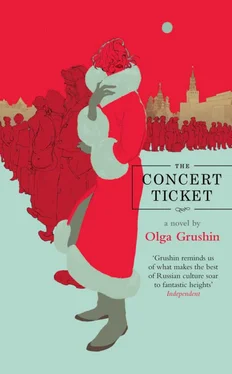So it was then that I noticed the first bead. There was a bead, a vivid blue speck of light, wedged in one of the cracks in the hardwood floor. When I saw it, I felt the same kind of stillness I used to feel playing a game I had invented as a very young child. I would dig in the snow, searching for what I called a “secret,” which I myself would have buried under a shard of glass some days before—a candy wrapper, a shred of silk cloth, any other small treasure I had mined from my winters in the countryside. Sitting on the floor as the two men with fluttering hands unrolled the carpet, I was brushed by the same kind of happiness I had felt when my stiff fingers would scratch away a hard layer of snow to reveal the bright burst of miraculous color.
One bead was all it took before I saw another one, and another, and another—before I realized that all the cracks in the living room floor were filled with beads.
They put the carpet down, but every afternoon when I returned home, I would lie on the floor, still in my damp dancing clothes, peel a corner of the carpet away, and labor at the cracks with the tip of a pin. After a while, my eyes would grow tired, and I would begin to imagine the whole world as one dark, flat, unclean expanse through which flowed threadlike lines of melted glass, of molten gold. Whenever I caught one bead stream with the sharp prick of the pin and liberated it from its confinement, its droplets would turn into jeweled grains and leap all over the floors. There were hundreds of them—cones striped red and white like circus hats, glowing glass balls, tiny cubes with silver splotches on their sides. In the end, all of them fit into a small caviar jar. I kept it for a long time. It was lost in the revolution.
Now, if I had a listener, he would ask, of course, where the beads came from. He would not know me well enough to distrust my answers. I would be glad to tell him. The beads were the last, forgotten fragments of a special, enchanted world, like petrified coral and shells left embedded in rocks centuries after the sea has retreated from its black depths to a shoreline with beach umbrellas and plastic buckets. I used to imagine it, this world. It had once been filled with joyful, mischievous creatures who flew on the backs of dragonflies, sewed curly clouds onto the skies, pretended to be mossy weathervanes on the spires of ancient castles, tossed sunbeams at one another. When the sunbeams fell to the floor, they crystallized into tiny pieces of glass.
Pardon me? Oh, is it really that important? Fine, then, they were probably spilled by a couple of children whose parents had rented the apartment before us. They might have left the city in a hurry—perhaps there’d been a violent upheaval in their country. Or maybe a weak-eyed seamstress had spent years in a cozy armchair by the window, doing handiwork for sale. Or else—or else a girl working on an embroidered wallet for her beloved had received sudden news of his death, and let it all fall from her hands.
So now you wish you hadn’t asked.
The real explanations are usually the simplest, and often the saddest.
7

ON A DREARY DAY toward the end of February, when tempers had worn raw, a particularly ugly brawl broke out in the line, complete with the usual threats to polish someone’s glasses clean and dust off someone else’s hat with a brick. People were scrambling to get out of the way of the impending fracas when a short man with a jet-black beard was seen stepping forth and addressing the warring factions. Inevitably, voices rose in doubt—“Who the hell is he?” “One of those stuck-up university folks, I bet.” “Nah, he looks like a pirate.” “All the same, why should we listen to him ?”—but eventually the line agreed to hear him out. The man, it transpired, had a radical reorganization to propose, beginning with the separation of those waiting for the Northern Nightingales tickets from those hoping to attend the symphony, and ending with numbers, from 1 to 300, being assigned to everyone in the symphony camp. This line, he said, was unprecedented in its nature; they needed to devise a few basic rules, make a list, check off the names; life would become immeasurably more civilized for all involved.
He talked rather at length. Some were able to understand him.
There followed the times of chaos, the times of confusion, the times of arguments. For days snow fell without cease, in big flakes, which flared up, theatrical, brilliant, as they passed under the streetlamp. The arguments died down slowly. On the fourth day, when the snow had dwindled away at long last, a middle-aged woman with a tired face, dressed in an ill-fitting coat and wet low-heeled shoes, stood clutching a square bit of paper in her chilled, reddened fingers. Her number was 137. In front of her was a woman in her thirties, with a bright mouth and a fur hat low on her forehead, and behind, a small boy with fragments of a cloudy sky for eyes.
The woman with the tired face turned from the one to the other.
“I’ve seen you both many times, but I don’t know your names,” she said. “I’m Anna.”
PART TWO
SPRING

1

THE DAYS WERE LENGTHENING, turning pale and deep. Under skies the shade of northern porcelain, the snow had begun to melt, and the glittering, leaking, rushing unrest of waters filled the city with a noise like that of a constant twittering of birds. Their home, though, lay quiet and still, as if under a snowdrift. His mother spent her afternoons waiting in line, and his father moved through the rooms in a sulking, taciturn mood, slamming doors and spitefully banging his tuba against corners. Alexander himself felt depressed and, to make matters worse, was having trouble sleeping: since the beginning of March, their building appeared to have sprung numerous leaks, through which the outside world seeped in unsettlingly—little drafts of a springtime hum and bright, breezy smells, which wafted through the lifeless air of their apartment, keeping him awake.
In the middle of the month, he had a particularly restless night. Some neighbors were talking, and snippets of strange conversations kept invading his dreams. “Pardon me?” someone was saying somewhere, quietly but distinctly. “No, I’m afraid that was not exactly true, the jar wasn’t lost in the revolution. Many things were, some tangible, some rather less so—but not the beads. It just makes the story more dramatic, don’t you find?” There was a pause, and he had just begun to fall asleep when the same old voice embarked on a long, pointless story about two men in workmen’s overalls carrying a gigantic crystal chandelier through crooked medieval streets. The chandelier was all trussed up like a felled beast on a stick, and the crystals clicked softly, and wisps of the light watercolor skies became entangled like silk petals amidst the pieces of radiant glass, and some little girl stopped openmouthed and stared, then followed after them as if charmed, and it went on and on, and he thought, half awake, The walls in this damn building are absurdly thin, is this coming from above or below, and who spouts such inane nonsense at three in the morning anyway; and he even considered banging on the floor or the ceiling, though he was not sure which—and though a part of him rather wanted to hear how the tale ended—when suddenly there was silence.
He was starting to drift off once more, or had perhaps drifted off already, when the voice—his grandmother’s voice, he knew all at once—said coyly, “Oh, so you’ve noticed at last. Yes, I did stop wearing them. Why? Because they are diamonds, and diamonds, my dear, are worn only in winter. Spring has come.”
Читать дальше














